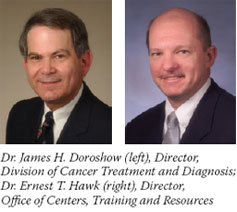
Guest Update by Drs. James Doroshow and Ernest Hawk
Moving Ahead with Translational Research
 The recent release of the final report of the Translational Research Working Group (TRWG) and its approval by the National Cancer Advisory Board, marks an important milestone for NCI. After 2 years of work, we're hopeful that TRWG's recommendations, along with activities already taking place as a result of recommendations made 2 years ago by the Clinical Trials Working Group (CTWG), will lead to more rapid progress in translating important research findings into new, effective interventions. The recent release of the final report of the Translational Research Working Group (TRWG) and its approval by the National Cancer Advisory Board, marks an important milestone for NCI. After 2 years of work, we're hopeful that TRWG's recommendations, along with activities already taking place as a result of recommendations made 2 years ago by the Clinical Trials Working Group (CTWG), will lead to more rapid progress in translating important research findings into new, effective interventions.
TRWG was led by co-chairs Drs. Ernest Hawk of NCI's Office of Centers, Training and Resources; Lynn Matrisian of Vanderbilt University; and William Nelson of Johns Hopkins University. It's important to stress that the TRWG report - developed by some of the most well-respected translational and clinical research experts within and outside of NCI, with additional input from literally hundreds of scientists and members of the cancer community - focuses on "early translation," that is, the work done to move basic research discoveries into phase I and II clinical trials. The recommendations are a natural complement to several CTWG-related activities, which are focused on "late translation," primarily phase III clinical trials.
At their core, the TRWG recommendations are intended to help define and facilitate the appropriate "handoffs" so that fundamental discoveries - such as those related to potential new imaging-based risk assessment methods, new immunotherapy approaches, or lifestyle interventions, among others - can be efficiently evaluated in early-phase clinical trials. That includes activities such as developing project management plans, establishing access to core services such as imaging libraries and well-annotated biospecimens, and developing intellectual property agreements with industry or other third parties.
The recommendations are not intended to replace or impinge upon discovery research. Quite the contrary, they are intended to create a coordinated and collaborative national enterprise focused on the distinctive needs of research that follow from promising basic discoveries.
In total, TRWG developed 15 recommendations - with suggested plans for implementing them - categorized into three main themes: coordinated management, tailored funding programs, and operational effectiveness.
Under coordinated management, for example, are specific recommendations for establishing an organizational approach to managing the diverse early translational research portfolio that exists throughout NCI's divisions and centers, and a transparent, inclusive prioritization process to identify the most promising early translational research opportunities.
Several tailored funding programs are recommended, including the establishment of special programs to advance specific projects deemed especially promising and to support collaborations between extramural investigators and industry. The former program, called the Special Translational Research Acceleration Project (STRAP), would support an integrated research and development program designed to achieve a specific clinical or product development goal.
Recommendations that fall under operational effectiveness include building a project management system that would involve staff at NCI and investigators' institutions to help oversee projects and develop enhanced approaches for negotiating with industry over issues related to intellectual property and access to investigational agents.
TRWG sees these recommendations as evolutionary, not revolutionary. This is particularly evident in how some of the recommendations dovetail with ongoing CTWG-related activities. One excellent example is the establishment of a subcommittee of the Clinical Trials Advisory Committee that will focus on translational research.
We already have received excellent feedback on the TRWG recommendations. Several foundations, for instance, have indicated they would be interested in helping to support the STRAP program, and industry representatives who met with TRWG during its deliberations were very enthusiastic about supporting and expanding collaborative efforts and working through logistic and legal hurdles to early translational work.
Decisions about how NCI will address the TRWG recommendations must still be made. But we're hopeful that, combined with ongoing activities spurred by the CTWG recommendations, these recommendations will lead to measurable and meaningful progress in getting new, more effective risk assessment strategies and interventions to those at risk and those diagnosed with cancer far more quickly than has been possible in the past. |